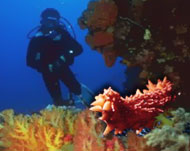Delicacy and danger in Red Sea
The Red Sea has a virtual treasure trove of brightly coloured fish and plants which lure divers by the hundreds, but the fat, slug-like sea cucumber is causing some to risk their lives.

The unlikely looking creature is prized throughout Asia as an aphrodisiac, or healing agent. With unemployed Egyptians looking for easy money, officials fear more diving accidents and destruction of coral reefs through the possible extinction of this toxin filtering creature.
“It is a recipe for disaster in every way,” said Karim Hilal, who heads the Red Sea Association for Diving and Watersports in Hurghada, a magnet for divers from around the world.
Hilal said inexperienced divers were being given money and shoddy equipment by captains of fishing boats, and sent to dive as deep as 40-50 metres, three or four times a day in dangerous succession.
Most of these divers are unemployed college graduates who have never learned that they need to rest on the surface between dives, to dissolve nitrogen that accumulates underwater in the bloodstream, Hilal said.
Hilal said that he had rescued several stranded divers while on a call to recover a body.
“They were in the middle of nowhere” and had suffered dehydration and decompression sickness (DCS) known as the bends, he said.
Egyptian ban
Of nine diving accident cases treated this year in the three recompression chambers along the Red Sea coast, seven resulted from sea cucumber fishing, said Dr Hanaa Nasim who mans the diving emergency centre in the coastal diving town of Safaga.
 |
|
Common varieties are 30-40cm |
Even though the Egyptian government imposed a ban earlier this year on fishing the creature, sea cucumber can still be exported legally, which makes it difficult to stop the poaching, according to environmentalist Muhammad Habib.
Egypt is one of several countries plagued by sea cucumber overfishing in recent years, along with Equador’s Galapagos Islands, India and the Philippines which has enacted an absolute ban on their capture.
But demand continues throughout Asia for the expensive delicacy with its alleged aphrodisiac and healing properties.
Soaring demand
In China, the processed carcasses, called hai-som, are believed to have curative powers. The Japanese eat them raw, nibble on their pickled intestines over drinks and eat their dried gonads as a special treat.
|
“Coral reefs in the Red Sea can be likened to a desert oasis. Without the reef as a source of nutrients the entire ecosystem of the sea would collapse” Muhammad Habib |
Malaysians bottle sea cucumbers in a pure form to cure internal ailments such as ulcers, and rub a mixture of the extract on toothaches and cuts.
The sea cucumber risks being poached to extinction in Egypt, which would threaten the life of the Red Sea by annihilating a basic building block of its ecosystem, experts say.
“Coral reefs in Egypt’s Red Sea can be likened to a desert oasis” where living reefs provide nutrients for the sea, Habib said.
“Without the reef as a source of nutrients the entire ecosystem of the sea would collapse,” deterring certified divers and snorkellers, and hurting the vital tourism industry, he said.
Marine earthworm
The sea cucumbers do the job of an earthworm in soil, recycling waste and aerating the sea floor, but it looks more like a fat slug or a squat, overstuffed sausage.
|
“Stop sea cucumber exporting from Egypt. Why would people fish if they cannot sell what they’re fishing” Amr Ali, |
Trailing sand-coloured beads of nutrient-rich excrement behind, as it creeps millimetres per minute along the sea floor, this ugly relative of the starfish filters toxins out of the water.
Whether disgusting or delicious, sea cucumbers are essential for keeping the water clean and the snorkelers coming back, according to an environmental group which seeks to maintain the Red Sea’s top rank among dive sites worldwide.
Amr Ali, a member of the Hurghada Environmental Protection and Conversation Association who owns a small fleet of dive boats, said he worried that cloudy water would push sport divers towards other reefs with wider fish variety.
“Stop sea cucumber exporting from Egypt,” he said. “Why would people fish if they cannot sell what they’re fishing?”